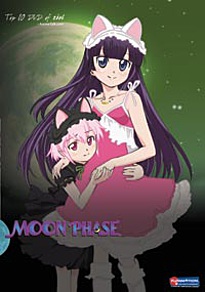Review
by Carl Kimlinger,MoonPhase
DVD 6
| Synopsis: |  |
||
Crushed by Kouhei's terror at seeing her via the jougan "purifying eye," Hazuki is thrown again into conflict with the vampire agents of her father. An act of betrayal, and Kouhei's inability to control his gift, lead Hazuki to make a decision that will sacrifice everything she has gained. Her friends, however, are unwilling to let her go without a fight. After, Hazuki must deal with being a big sister, and—weirder still—with being stranded at sea. |
|||
| Review: | |||
The bad news: every premonition of sliding quality from the past couple of volumes is confirmed. The good news: it only lasts two episodes. Then the fun starts again. But before you can get to it, first it's necessary to slog through the series' sometimes tedious, sometimes infuriating, consistently disappointing climax. To be sure, there are moments of genuine pathos. Kouhei's reaction to seeing Hazuki with the jougan hurts, and Hazuki's resolution at the end of episode 23 is simply heart-breaking. But the causes and consequences of each moment of honest emotion are deeply dissatisfying. Both moments ultimately pen Hazuki into the role of damsel in distress, an entirely passive role ("Help me Kouhei!") that leaves a nasty taste in the mouth. And Kouhei's jougan, while giving rise to one affecting scene, is obviously a giant deus ex machina cop-out in the making. In fact, the magical battling is generally inferior to that of earlier episodes. Not in its visual execution—that has the same topsy-turvy, color-shifting appeal as always—but in concept. The various battles with Count Kinkel were carefully planned supernatural skirmishes in which strategy and teamwork were crucial to their success. In these episodes, mystical clashes have a "throw generic flashy magic stuff at the enemy until the gears of the deus ex machina get moving" feel. The villains compound the problem with their dearth of menace; the stakes just aren't as high this time around. Toss some ripe cheese into the mix, and the smell it produces is less than entirely savory. Not that director Akiyuki Shinbo is unaware of this fact. He undercuts most of the truly ridiculous scenes with pointed little visual gags, broad cinematic winks that let the audience know that he's fully aware of just how silly it all is. And then, suddenly, the climax passes. An episode is set aside for tying up loose ends, and does so with a humor spiked with bursts of loneliness and poignancy that almost resets everything that dragged the second half down. Hazuki regains her spunk, the core of mutual loss that was excised from her and Kouhei's relationship returns, and you even thank the creators for their stupid dead-but-not-dead trickery from earlier when you see Elfriede and Gramps getting weirdly lovey-dovey. As an aside, anyone who thinks that the previous sentence was a spoiler, should seriously have their eyes (or their brain) examined. The final episode is an extra story that finally discards anything resembling logic; a twenty-five minute joke about the Mido household being stranded at sea that vents some apparently seriously repressed comic urges on the part of the director. It's a brand of comic stream-of-consciousness that strongly foreshadows the direction that Shinbo's next project, the completely unhinged Pani Poni Dash!, would take. And it's quite frequently hilarious, while still finding time for some priceless Arte cuteness. The return of lighter content also means the return of some of Shinbo's stranger comic inventions, like the cutaway house (used to truly surreal ends at the tail of episode 25 and throughout episode 26) and fake cinematic goofs (boom mikes in the frame). The other visual merits are the same as always—ravishing—while the music remains as thoroughly enjoyable and periodically stunning as ever. The last two episodes end by playing the "Neko Mimi Mode" opening over a slow zoom out from an amusing still of the surviving cast. There isn't a whole lot new to say about the dub (see previous reviews), but it must be said that Elfriede and Gramps romantic banter is absolutely hilarious in English ("honey schnookums!"). The series' booklet covers the usual breadth of information, including a revealing interview with Keitaro Arima, the creator of the Moon Phase manga. The clean opening covers the series' standard opening, while the closing showcases the superb new visuals for the ending song. The climax is as lackluster as the buildup to it would indicate, but it is blessedly short. The two follow-up episodes revert back to a more humorous time, taking the time to tie up loose ends before throwing all reason and logic out the window and reveling in one episode of unbridled weirdness. |
|
The views and opinions expressed in this article are solely those of the author(s) and do not necessarily represent the views of Anime News Network, its employees, owners, or sponsors.
|
| Grade: | |||
|
Overall (dub) : B-
Overall (sub) : B-
Story : C+
Animation : A-
Art : A-
Music : B
+ Last two episodes offer some closure, plenty of entertainment, and a pile of eccentric humor. |
|||
| discuss this in the forum (1 post) | | |||
| Production Info: | ||
|
Full encyclopedia details about Release information about |
||